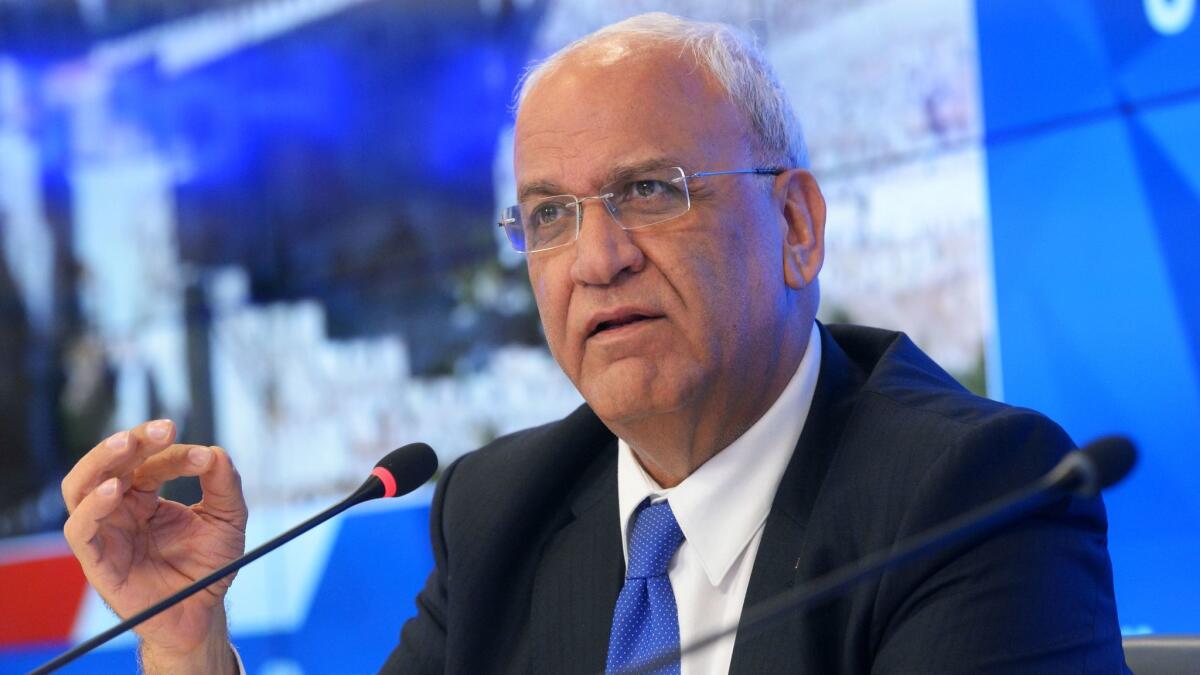Palestinian leaders threaten to withdraw formal recognition of Israel

- Share via
Reporting from jerusalem — It was a historic day for the Middle East and a U.S.-backed effort to bring peace. On Sept. 9, 1993, the Palestine Liberation Organization recognized “the right of the State of Israel to exist in peace and security.”
Now, more than two decades later — as U.S. Vice President Mike Pence prepares to visit the region — Palestinian leaders are threatening to take back that decision.
The PLO is examining whether “you can rescind recognition,” said Hanan Ashrawi, a prominent lawyer on the group’s executive committee. “You can suspend or cease relations, but we are examining if revocation can be done.”
At issue is President Trump’s announcement last month that the United States would recognize Jerusalem as the capital of Israel and move the U.S. Embassy there from Tel Aviv.
That would reverse decades of U.S. policy and reduce prospects of the two-state solution, the long-held international consensus that any peace deal would include creation of an independent Palestinian state alongside Israel. Palestinian leaders have never accepted Israeli rule over all of Jerusalem and insist that East Jerusalem be the capital of any future Palestinian state.
In an interview this week with “Voice of Palestine” radio, Palestinian chief negotiator Saeb Erekat said that Trump’s announcement “removed Jerusalem from negotiations” and that the Palestinian Authority would reject any and all proposals for peace negotiations with Israel until the U.S. “decision on Jerusalem is annulled.”
“Our peace will not be at any price,” he said.
On Wednesday, Israel’s internal security agency, the Shin Bet, announced that Palestinian attacks against Israelis had tripled since the announcement of Trump’s Jerusalem policy change, with 249 incidents in December, compared with 84 incidents in November. Most were fire bombings.
Two Palestinians were killed and three were wounded Thursday in a renewed wave of violent clashes with Israel forces. Palestinian officials reported that both of those killed were 16-year-old boys, one in a protest in the Gaza Strip and the other near the West Bank city of Nablus.
Pence is scheduled to arrive in the region Jan. 20 for a four-day visit.
“The Vice President is traveling to the Middle East to reaffirm our commitment to work with the United States’ allies in the region to defeat radicalism that threatens future generations,” Pence’s press secretary, Alyssa Farah, said in a statement. “The Vice President is looking forward to meeting with the leaders of Egypt, Jordan, and Israel to discuss ways to work together to fight terrorism and improve our national security.”
Notably absent from the schedule was any meeting with Palestinian leaders — marking the first time in decades that an official visit by a senior American figure does not include such a meeting.
Palestinian authorities declared Pence persona non grata just before Christmas, when he was initially expected in the region. That trip was postponed due to the close Senate vote on tax reform.
Ashrawi confirmed that Pence remains unwelcome.
“Of course there are no planned meetings,” she said. “We will not meet any American in the context of negotiations.”
The Palestinian Authority governs the West Bank and is the internationally recognized Palestinian representative. But the PLO remains the most powerful political faction, with Palestinian Authority President Mahmoud Abbas at the helm of its executive committee.
The PLO leadership is scheduled to convene early next week to “discuss several recommendations toward holding Israel accountable to advance with the realization of the inalienable rights of the Palestinian people,” a statement from the executive committee said.
“There are lots of ideas floating around and proposals and questions,” Ashrawi said. “In each and every case we have to look at legality and all the ramifications and how to prepare for them.
“For the sake of the two-state solution, we can demand Israeli recognition of the Palestinian state and demand that Israel define its borders,” she said. “It’s the only country without borders. We are working nonstop on these questions. The Palestinian people are quite upset. They feel betrayed and feel that the United States has taken sides and subverted the prospect of peace and that Israel has become totally emboldened and is escalating in a historical way.
“We are at a very dangerous junction,” she said.
Aaron David Miller, a distinguished fellow at Washington’s Woodrow Wilson Center and a veteran American peace negotiator, said, “Neither Israel nor the Palestinians have a stake in escalating” the conflict.
“But the political and security environment is tense, so things could easily deteriorate,” he said. “Visits can often afford opportunities to make a point.”
Trump has referred to an Israeli-Palestinian peace agreement as “the ultimate deal.” But neither Palestinian nor Israeli officials said they have seen any part of a possible American proposal to restart talks that have been halted since 2014, when an initiative by then-Secretary of State John F. Kerry faltered.
In a pair of Twitter messages on Jan. 2 , Trump wrote that “we pay the Palestinians HUNDRED OF MILLIONS OF DOLLARS a year and get no appreciation or respect. They don’t even want to negotiate a long overdue peace treaty with Israel. We have taken Jerusalem, the toughest part of the negotiation, off the table, but Israel, for that, would have had to pay more. But with the Palestinians no longer willing to talk peace, why should we make any of these massive future payments to them?”
Tarnopolsky is a special correspondent.
More to Read
Sign up for Essential California
The most important California stories and recommendations in your inbox every morning.
You may occasionally receive promotional content from the Los Angeles Times.










